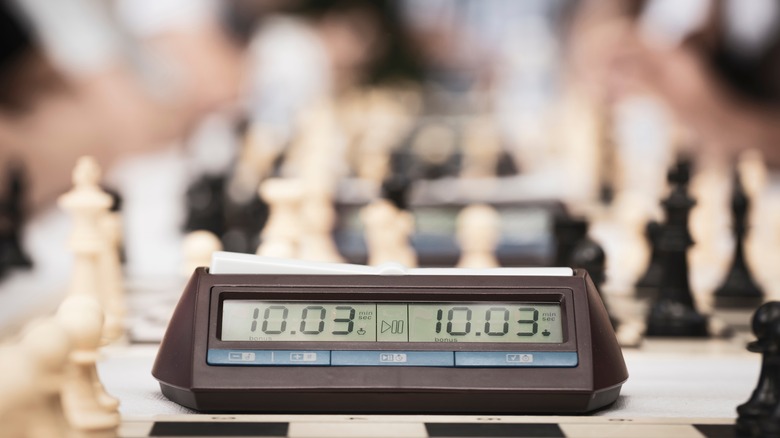The Controversial Scandal Rocking The Chess World Is Too Bizarre To Believe
Chess got big in the U.S. in 2020, according to The New York Times, thanks to two things: The Covid-19 pandemic, which prompted millions of Americans to take up the game since we were all in lockdown and there was little else to do, and the hugely popular Netflix series "The Queen's Gambit," about a fictitious American chess champion. Two years on, chess remains popular, and membership in chess clubs has skyrocketed now that face-to-face play is possible again.
In September 2022, one of the biggest scandals to rock the chess world happened when an American teenager, Hans Niemann, won a shocking upset against the current world champion, Magnus Carlsen, at a tournament in St. Louis. The stunned champion withdrew from the tournament following the loss, according to the New York Post, and then later posted a cryptic message on Twitter in which he obliquely suggested his adversary had been cheating. Later still, Elon Musk came up with a hypothesis as to how the upstart American was able to topple the Norwegian, and it involves sex toys, of all things. (It bears noting that the chief arbiter of the tournament has decreed that there was no cheating at this particular tournament, per Dotesports.)
It's impossible to cheat at chess, or is it?
On the surface, at least, it would seem all but impossible to cheat at chess. There is no element of chance in the game save for which player plays white and which plays black, and in tournaments, those decisions are made well before the players even sit down at the board. If a player attempted to make an illegal move in order to cheat, his opponent would (should) notice, as would (should) a tournament official.
But what if the player had a confederate telling him what moves to play? Then they would be forced to come up with some kind of signal that neither the other players nor the tournament officials would notice. That, too, is going to be highly unlikely to pull off, but that hasn't stopped the allegation from being made. That's exactly how a player in a 1978 tournament allegedly cheated, according to Chess.com: by the right moves being signaled by the color of yogurt brought to the alleged cheater.
But what if there was a way to transmit the right moves to the player in a way that no one else could notice? As it turns out, in 2022 there is indeed such a device, although it wasn't intended to be a chess cheating device. Rather, it was and is a sex toy.
A vibrating sex toy
The internet and, along with it, Wi-Fi and Bluetooth, have been boons to the world of communication. The technologies have also brought about some innovations in the world of, of all things, sex toys. As Women's Health explains, users can now purchase remote-control, vibrating sex toys. We'll leave it to the reader to answer why users would want such items to possibly be controlled by another person.
Meanwhile, as it relates to the St. Louis tournament and the resulting cheating scandal, none other than billionaire Elon Musk — who had nothing to do with this tournament specifically or professional chess broadly — suggested in a tweet that Hans Niemann used vibrating beads inserted into his anus, an accomplice using coded sequences of vibrations to telegraph the moves. As Latest LY reports, in a since-deleted tweet, Musk wrote, "Talent hits a target no one else can hit, genius hits a target no one can see ('cause it's in your butt)," putting his own interpretation on an existing quote.
What does all of this mean for chess? For the competitors in the recent St. Louis tournament, nothing at all: The man to beat has quit, the upstart American who beat him fizzled in the tournament save for his upset win, and the tournament is over. It remains to be seen if future anti-cheating measures will include full-body scans or disabling wifi in order to keep competitors from cheating in this unusual way.


